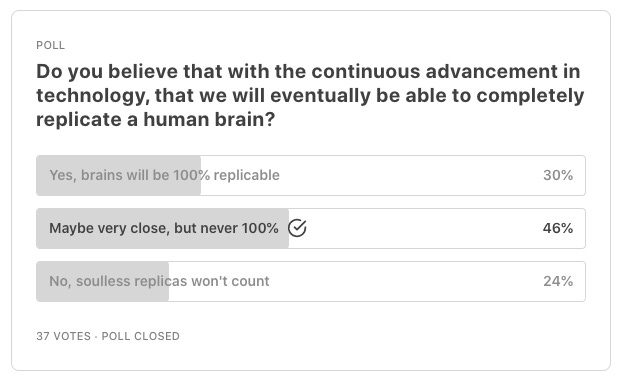Issue 144
🧠📥 Scientists can now “download” images from our imagination. Nonprofit organization replaces entire staff with a chatbot. Hacking, humans, and the cybersecurity conundrum.
Happy June, Bizarro readers.
As always, we’ve done our best to scour the world wide web for the most interesting tech stories to share with you. This month we’ve got the latest update in the quest to decipher the inner workings of the human brain, along with a recent story about “AI coming for our jobs”. We round it out with a fascinating, insightful interview from a legal philosopher and cybersecurity expert at Yale University. Here’s the breakdown:
🧠📥 Scientists can now “download” images from our imagination
🤖💬 Nonprofit organization replaces entire staff with a chatbot
🐱💻 Hacking, humans, and the cybersecurity conundrum
Let's get into it!
📰 From the Newsroom
🧠📥 Scientists can now download images from our imagination
Scientists in Singapore are developing a mind-reading technique using AI and brain scanning to reproduce images that individuals mentally picture, potentially transforming communication for people with disabilities. However, the technology also raises urgent ethical and legal questions about potential misuse, such as corporate interests and surveillance. Remember this WEF video from our February newsletter?
The mind-reading technology, known as "Mind-Vis," leverages a large-scale dataset from functional magnetic resonance imaging (fMRI) to train an AI model to associate specific brain patterns with image features like color, shape, texture, and semantics. It can recover unseen visual stimuli from new images based on the analysis of brain activity.
The technology, if refined and made portable, could open up new possibilities for people with disabilities to interact with advanced machines, allowing them to convey messages through their minds. However, commercialization would require the shift to portable devices like EEG headbands instead of cumbersome fMRI machines.
Safeguards and guidelines are necessary to prevent misuse of the technology and protect mental privacy. Consent is currently required for the technique to work, but as AI and devices advance, there is a theoretical risk of partial mind-reading without permission.
On the one hand, the development of AI mind-reading technology seems like a great step forward for improving the lives of individuals with disabilities and advancing our understanding of the human brain. On the other hand, this is giving off heavy “Minority Report” vibes. What do you think about it? 🤔
🤖💬 Nonprofit organization replaces entire staff with a chatbot
NEDA, the largest nonprofit organization in the U.S. that’s dedicated to helping people with eating disorders, has decided to replace its helpline staff with a chatbot named "Tessa" starting June 1. The transition has sparked controversy, with critics claiming it is a strategy to undermine the unionization efforts of the helpline staff.
The helpline workers, consisting of paid employees and volunteers, sought to unionize due to feeling overwhelmed and understaffed, but NEDA refused to recognize their union. Shortly after winning an election with the National Labor Relations Board, the four full-time union members were fired and replaced by the chatbot.
Tessa, the wellness chatbot, was developed based on therapeutic methods and trained to address body image issues. It follows predetermined pathways and lacks decision-making capabilities, with a limited range of responses.
The decision to replace the helpline with Tessa has been met with criticism, as it eliminates the personal aspect of support provided by individuals with lived experiences of eating disorders. The helpline staff and their supporters argue that a chatbot cannot replace human empathy and express concerns about the harm this decision may cause to those suffering from eating disorders.
The controversy surrounding NEDA's decision underscores the ongoing debate over the role of technology in providing mental health support for vulnerable populations, and of AI replacing human jobs. On the flip side, NEDA does have a job opening that it’s looking to fill with a human candidate. The position? None other than Chatbot Specialist.
🐱💻 Hacking, humans, and the cybersecurity conundrum
In the book "Fancy Bear Goes Phishing: The Dark History of the Information Age in Five Extraordinary Hacks," author Scott Shapiro explores the world of hacking and cybersecurity. Shapiro, a legal philosopher at Yale University, delves into the human aspect of hacking and argues that cybersecurity is not a problem that can be permanently solved through technological means alone.
The book highlights five hacking cases, including the notorious Morris Worm, to illustrate the history and impact of hacking.
Shapiro emphasizes that hacking is ultimately about human behavior and cognition rather than programming alone. He discusses the concept of "metacode" and how hackers exploit the philosophical principles of computation.
The conclusion of the book suggests that perfect cybersecurity is impossible and that the focus should be on understanding human behavior and improving education and cultural attitudes towards hacking.
Shapiro’s book serves as a reminder that hacking is not solely a technical issue but one that requires a broader understanding of human behavior. This interview sheds some interesting light on the topic of cybersecurity and also provides some comfort to most of us, because as Shapiro reveals - for most people, taking some basic precautions means that 90 percent of the time, they're going to be OK. Why does he say that? Well, you’ll have to read the interview to find out.
⛓️ Ten Must See Links of the Month
Elon Musk’s Neuralink announced last week that it obtained clearance from the US Food and Drug Administration (FDA) to move forward with a human clinical study of brain implants designed to establish a direct brain-computer interface.
In the latest case of when relying too much on ChatGPT goes horribly wrong, we have a lawyer who used it to file a lawsuit against Colombian airline Avianca, but now that lawyer is in big trouble with the Judge. Find out why.
Google is going to start using generative AI to boost search ads’ relevance based on the context of a query. In other words, the text of a company’s ad will be uniquely customized to each search, with the goal of increasing click-through rates.
Crowdcast is a new weekly AI-generated podcast that takes the top 3 comments from a subreddit (r/crowdcast) and runs them through a series of AI programs to develop a script, an audio file of that script, and background music for each episode.
As we increasingly rely on technology for just-about-everything, we should strongly reconsider the role of human oversight and the value it brings. Last weekend in the U.K. technology failed not once, but twice, affecting more than 20,000 people.
A team of scientists from Harvard Medical School and biotech company Life Biosciences have developed a new gene therapy that can reverse vision loss in primates, potentially laying the groundwork for treatments in humans as well.
Adobe Photoshop is introducing a new AI tool called Generative Fill. It lets users easily extend images and make object additions or removals by using text prompts.
📽️🎞️ Are conscious machines possible? That is the question that Michael Wooldridge, a professor of computer science at the University of Oxford, and an AI researcher, attempts to answer.
If you do any kind of development work, you probably have a favorite text editor. Sublime Text is one of the most popular text editors designed with coders in mind, and this guide teaches you how to specifically use it for WordPress projects.
Are you sitting on mountains of data that you’d love to convert into some sort of useable, visual presentation for your next project? Then you need to check out this list of the ten best JavaScript data visualization libraries.
🎤 It’s How They Said It
"As we reach the upper limits of our production capability, humanoids will join the workforce with the ability to think, learn, and interact with their environment safely alongside us."
– One of the subheadings featured on figure.ai’s website, describing their flagship product, a humanoid robot worker.
🧮 The Numbers Game
2.5 hours is the magic number. As part of its carbon emissions reduction strategy, France has banned domestic flights for journeys where a train alternative can cover the same distance in under that time. Simply put, if you’re going somewhere in France and a train can get you there in 2 hours and 29 minutes, then you won’t have the option of flying there faster.
89% of Americans say they check their phones within the first 10 minutes of waking up, according to a 2023 survey of 1,000 people, aged 18 and older.
$1,799 is the price of Google’s first entry into the world of foldable smartphones. The phone, aptly titled Pixel Fold, is pricey, but it’s also seriously stacked with features. It’s even semi-waterproof!
⚒️ Tools and Resources
Eleven Labs: A young (founded in 2022) AI-powered voice generation tool that is able to produce life-like audio files from whatever text input you feed it. They have a free plan that supports up to 10,000 characters of voice generation per month. However, this is mainly for trial purposes because it doesn’t come with a commercial license and you have to provide attribution to Eleven Labs if you publish the audio. Paid plans start at $5 per month.
Perplexity: Launched in August 2022 by a team of heavy hitters from OpenAI, Meta, Quora, and Databrick, this AI-powered search engine acts as a chatbot and provides precise answers to questions, along with citations of where it pulled the information from. It also allows users to choose whether they want to search across the entire internet, or only specific sources, such as academic papers, Wolfram|Alpha, YouTube, Reddit, news articles, and Wikipedia. It’s currently 100% free to use.
🖼️ Image of The Month
The cover image for an AI generated conversation between…
📊 Results of Last Month’s Polls
Last month’s results were interesting. Both questions were set up in such a way where there were two extremes straddling a middle-of-the-road answer. With genetic customization, it was clear that the majority of you - even those who would take advantage of it to some degree - felt that going all in with full customization was too much. I imagine that with each successive generation, as our humanity becomes increasingly intertwined with machines, that these perspectives will shift in the opposite direction.
For the brain question, most voters seemed to hold a belief that there is some uniqueness to being human that AI and technology will not be able to completely replicate. That very same topic is the point of discussion in the 8th link in this month’s ten must see links list. If you scrolled past it, definitely scroll back up and give it a watch - especially if you voted on this poll. You’ll enjoy it.
If this is the first time you're here at Bizarro Devs and you liked what you read, then sign up here to get all future editions.
See you next time,
– Martin



